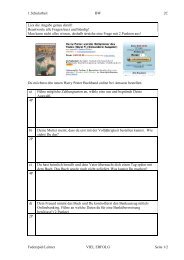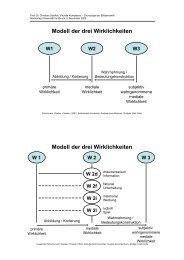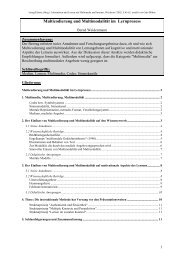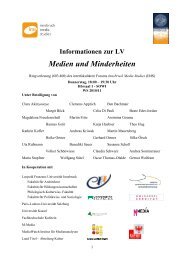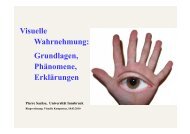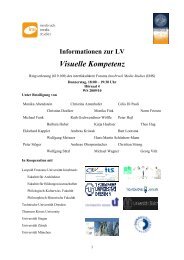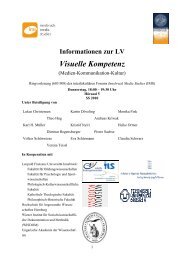Kinder und Medien - BiwiWiki
Kinder und Medien - BiwiWiki
Kinder und Medien - BiwiWiki
Sie wollen auch ein ePaper? Erhöhen Sie die Reichweite Ihrer Titel.
YUMPU macht aus Druck-PDFs automatisch weboptimierte ePaper, die Google liebt.
WS 08/09: Ringvorlesung <strong>Kinder</strong> <strong>und</strong> <strong>Medien</strong> (LV-Nr. 603.696)<br />
Abstracts zur Ringvorlesung <strong>Kinder</strong> <strong>und</strong> <strong>Medien</strong> (603.696)<br />
WS 2008/09<br />
Donnerstag, 18:00 bis 19:30 Uhr<br />
HS 4 (Achtung: 16.10.08 <strong>und</strong> 15.01.09 HS A – Technik)<br />
1. Auftaktveranstaltung: <strong>Medien</strong>tag 2008 (09. Okt.), 14-21 Uhr, Kaiser-Leopold-Saal,<br />
Karl-Rahner-Platz 1 (siehe Seite 4).<br />
2. Thomas Schröder: <strong>Kinder</strong> <strong>und</strong> Fernsehen (16. Okt. 08, HS A – Technik)<br />
Abstract<br />
Ob Sponge Bob oder GZSZ: Fernsehen ist bei <strong>Kinder</strong>n unumstritten das Medium Nummer 1. Im<br />
Durchschnitt verbringt ein Kind heute täglich etwa 100 Minuten vor dem Fernseher. In der Hälfte aller<br />
<strong>Kinder</strong>zimmer steht ein eigener Fernsehapparat. Viele Erwachsene sehen das mit Sorge. Fernsehen<br />
schadet, sagen einige ganz pauschal. Andere wollen lieber unterscheiden – aber wo verläuft die<br />
Grenze?<br />
Um diese Fragen geht es in der Vorlesung. Am Beispiel von ganz unterschiedlichen Sendungen soll<br />
nach dem Unterschied zwischen gutem <strong>und</strong> schlechtem <strong>Kinder</strong>fernsehen gefragt werden, nach<br />
Gefahren <strong>und</strong> Nutzen des Mediums, nach Vorlieben <strong>und</strong> Wünschen der <strong>Kinder</strong>. Was bietet das<br />
Fernsehen <strong>Kinder</strong>n? Was wollen <strong>Kinder</strong>, wer sind ihre Lieblinge, wie gehen sie mit dem Medium um?<br />
Zur Person<br />
Dr. Thomas Schröder ist Professor für „Linguistische <strong>Medien</strong>- <strong>und</strong> Kommunikationswissenschaft“ an<br />
der Universität Innsbruck. Studium der Germanistik <strong>und</strong> Geschichte in Tübingen <strong>und</strong> Wien.<br />
Assistententätigkeit an der Deutschen Sporthochschule in Köln (Sportpublizistik) <strong>und</strong> am Deutschen<br />
Seminar der Universität Tübingen (<strong>Medien</strong>wissenschaft – <strong>Medien</strong>praxis). Promotion 1993 über „Die<br />
ersten Zeitungen“. Habilitation 2000 in Linguistik des Deutschen <strong>und</strong> <strong>Medien</strong>wissenschaft (Titel der<br />
Habilitationsschrift: „Die Handlungsstruktur von Texten“). Schwerpunkte in Forschung <strong>und</strong> Lehre:<br />
Print- <strong>und</strong> Onlinemedien, Textlinguistik <strong>und</strong> visuelle Kommunikation, <strong>Medien</strong>sprache <strong>und</strong><br />
<strong>Medien</strong>geschichte.<br />
Moderation: Andreas Kriwak<br />
3. Norm Friesen: Children & Computers: Iconic Work through Symbolic Play<br />
(23. Okt. 08, HS 4)<br />
Abstract<br />
Children and computers have long been seen as sharing a special relationship. As soon as children<br />
were brought into contact with computers though technologies such as the personal computer,<br />
computer games, and programming languages like LOGO, commentators have been foretelling the<br />
emergence of new generations of accelerated learners, with abilities clearly exceeding those that have<br />
gone before. Many speak of this in terms of a new literacy or generational ability -- one that is unique<br />
or even revolutionary when compared to established literacies of print or television. Some would<br />
argue that this special relationship does not arise by accident: With the concrete-kinesthetic orientation<br />
of windows and mouse, personal computers have been deliberately designed to be accessible through<br />
the kind of playful exploration in which children excel. As a result of this and other factors, computers<br />
have the effect of blurring the bo<strong>und</strong>aries between adulthood and childhood. They make children into<br />
premature adult experts, placing them in apparent control of a world in which adults can find<br />
themselves reduced to the status of helpless children. But what are we to make of this? Do computers<br />
indeed speak the "cognitive language" of preoperational children, giving them a much more direct<br />
relationship with this technology? What is the significance of the relationship between computers and<br />
children for education? Looking these questions in the context of cognitive theories <strong>und</strong>erlying<br />
graphical computer interfaces, this paper will examine a number of informal descriptions of children's<br />
computer use, and consider some of the pedagogical aspects of the relationship between children and<br />
computers.<br />
7



